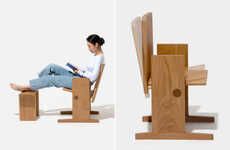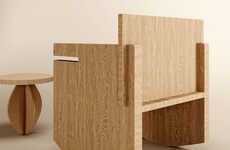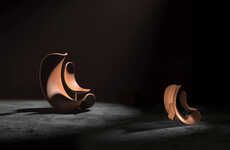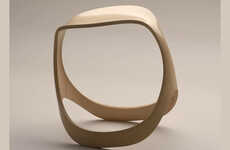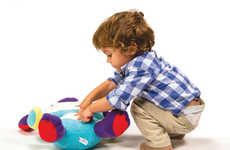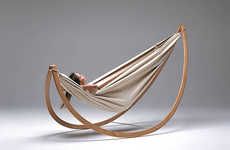
Michael Neville's Rocking Chair Design is Unusual and Eco-Friendly
Laura McQuarrie — February 20, 2014 — Eco
References: michaelnevilledesign & designboom
The 'Colonial Turd' rocking chair design by Michael Neville doesn’t quite resemble a traditional rocking horse or a chair, but it does introduce a new form and sustainability to the classic rocker without sacrificing any function. Although the Colonial Turd series is missing the actual rockers, the irregular shapes will be balanced out when a kid sits on one of them.
The unusual rocking chairs have a solid rock-like shape that comes from their makeup of post-consumer cardboard pulp. The chairs have names like 'Rad-Berry' and 'Coffee Bean,' which reflect the natural dyes that they were colored with. Since sustainability was a big focus in the making of the Colonial Turd series, the wood used to make the handles is native to North America, which is home to the Detroit-based designer.
Photo Credits: designboom, michaelnevilledesign
The unusual rocking chairs have a solid rock-like shape that comes from their makeup of post-consumer cardboard pulp. The chairs have names like 'Rad-Berry' and 'Coffee Bean,' which reflect the natural dyes that they were colored with. Since sustainability was a big focus in the making of the Colonial Turd series, the wood used to make the handles is native to North America, which is home to the Detroit-based designer.
Photo Credits: designboom, michaelnevilledesign
Trend Themes
1. Eco-friendly Furniture - This trend is an opportunity for designers to introduce new materials to the market and create a demand for environmentally-conscious products.
2. Irregular-shaped Furniture - This trend offers a unique design style for furniture makers to explore, with potential for creating eye-catching products that stand out in the market.
3. Post-consumer Waste Products - This trend presents an opportunity for entrepreneurs to find new ways to repurpose waste and create innovative products that reduce environmental impact.
Industry Implications
1. Furniture Design - This industry has an opportunity to explore new materials and styles to create products that appeal to eco-conscious consumers.
2. Sustainability - This industry can leverage the trend in eco-friendly furniture to promote environmental awareness and create demand for sustainable products.
3. Waste Management - This industry has an opportunity to collaborate with designers and entrepreneurs to find innovative ways to repurpose waste and reduce landfill volume.
5.3
Score
Popularity
Activity
Freshness














